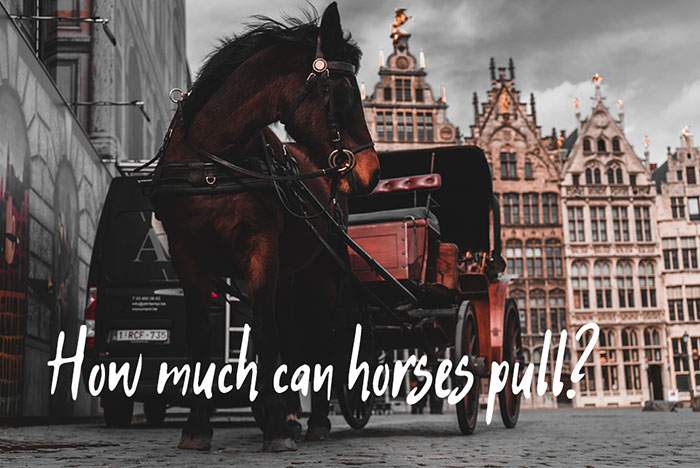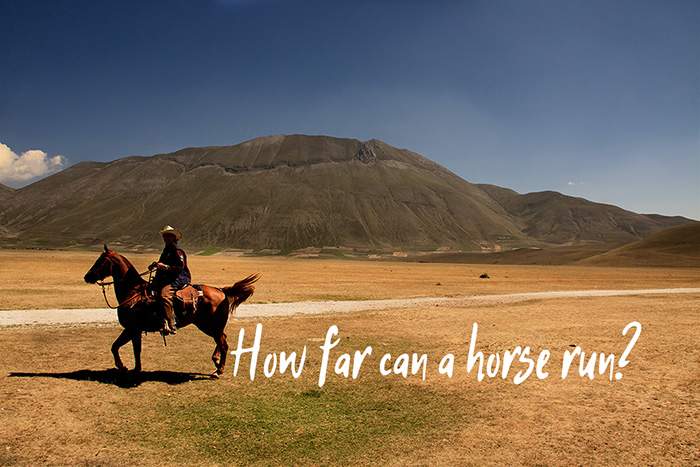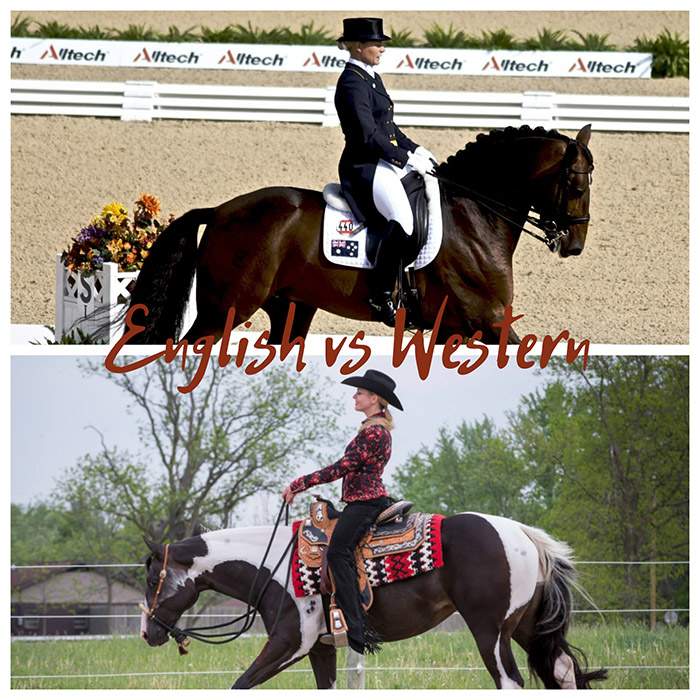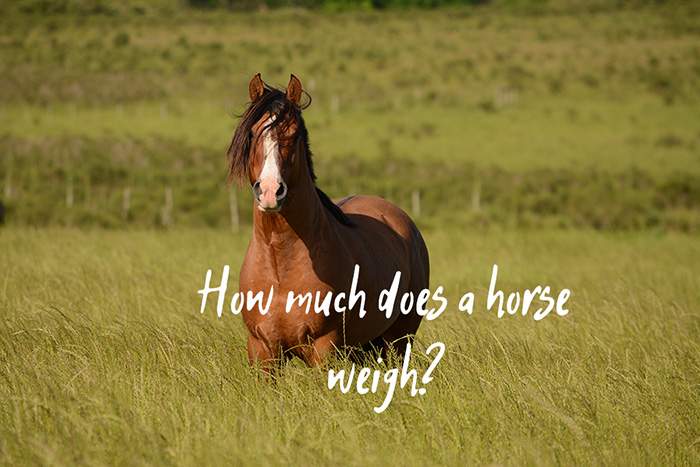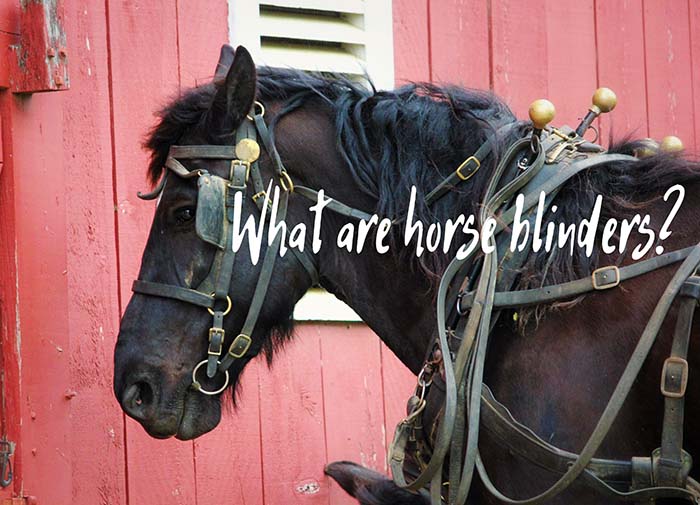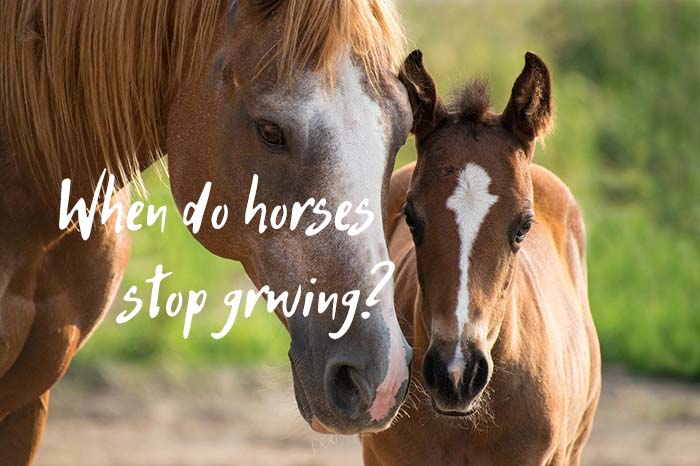How Do Horses Get Along With Other Animals?
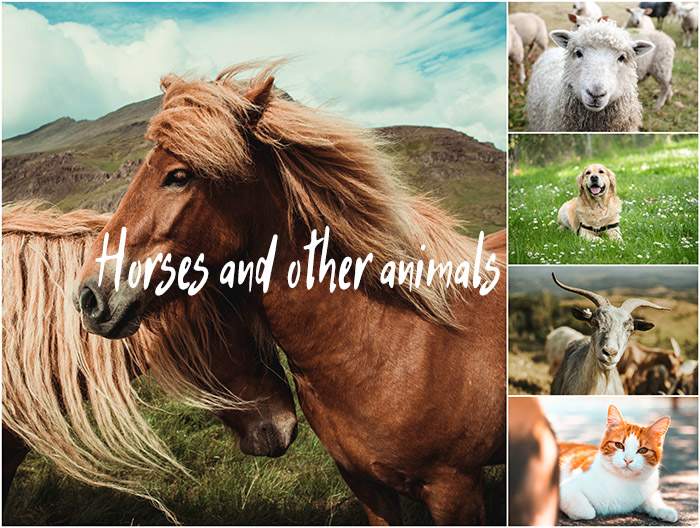
Horses are generally seen as kind-hearted and well-behaved, but how do they get along with other animals?
Generally speaking, they’ll get along just fine with other livestock or with pets. However, in order to answer this question accurately, we’ll have to take a deep dive and analyze a horse’s relationship with individual animals in order to determine if they truly get along.
It’s worth noting that horses do get along just fine with other horses, especially when they form a herd. That’s not always the case, though, as some horses might dislike each other for various reasons. We’ll get into that as well in this article, just so we can cover all the bases.
Horses are complex and intelligent animals. The average horse you see out on the fields at your nearest farm is likely domesticated, but we also have feral horses roaming the wilds. Those horses might not be as welcoming to other animals as their domesticated counterparts are, so we’ll have to analyze the relationship of feral horses with animals as well.
As you can see, we have our work cut out for us, so we better get started. Let’s first look into the relationship of horses with livestock and pets, and then we’ll move on to feral horses and how they interact with other animals in the wild.
Domesticated horses and other animals.
Do horses get along with dogs?
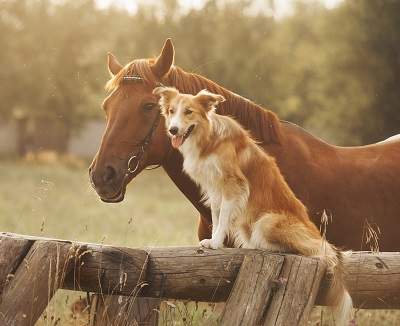
It’s fair to say that horses get along pretty well with dogs. We’ve seen countless videos of them acting like buddies, and it kind of makes sense if you think about it. Well-behaved dogs can be incredibly affectionate and protective of humans and other animals. Basically, dogs get along well with anyone, so why not horses too?
Dogs and horses have been partnering up for hundreds of years, as humans used them both extensively in hunting. This probably has something to do with them getting along so well in our modern days. However, few dogs are trained for hunting, and even fewer have a natural ability for it. Apart from hunting, dogs and horses can work together at ranches while herding livestock.
Both horses and dogs are social animals that seek companionship. A dog can be a faithful and caring companion for your horse. They can share living spaces together, sleep together, and spend time outdoors in each other’s company.
What if my dog and horse don’t seem to get along?
As I mentioned before, a well-behaved and balanced dog should have no issues making friends with a calm horse. However, there are instances in which the two animals might not like each other, or they might scare each other off. If that’s the case, there are some ways to mediate their friendship.
When you introduce dogs to horses and vice versa, make sure to do it slowly. Keep the dog on a leash and allow it to observe the horse and get used to its presence from a distance. You can allow them to get closer to each other if things go well. Keep in mind that dogs can get over-hyped and can charge at the horse in excitement. While the dog might be well-intended, this kind of behavior can spook a horse.
On the other hand, horses are considerably larger than dogs, and they can scare away a pup or even a medium-sized dog if the introduction is not done gradually. The most important thing you can do to help your two four-legged friends get along is to let them get used to each other’s smells. If they behave well, reward them both and repeat the process later.
Remember to show attention to both animals, and don’t pressure them if things don’t go according to plan. Don’t leave them alone together, and always make the introductions on equal ground.
How are horses with cats?
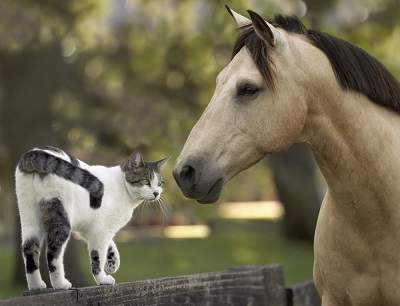
Horses are generally calm and don’t feel the need to bother anyone. The exact same thing can be said about cats. Want to hear another similarity between the two? Some horses will actively seek affection and will be more curious about interacting with other animals, while some will prefer to keep their distance and just relax.
Some cats will become curious about horses and will try to interact with them, at least in a limited way. They will rarely try to get a reaction out of the horse, or try to make it do something it might not want to. For this reason, horses and cats get along very well almost every time.
It would take a seriously unbalanced or aggressive cat to scare a horse away or to make it uncomfortable. Since cats are so much smaller than horses, they are rarely perceived as a threat. Still, it’s worth noting that some particularly territorial horses might have an issue sharing the same space with cats. That’s a rare occurrence, however.
If the cat has spent most of its life in the countryside, it might have already interacted with cows, sheep, goats, and other relatively large animals. That cat will likely have no issue spending some time in the proximity of a horse. A city that has never seen a horse, however, will likely be scared and hesitant. As always, introducing animals to horses should be done gradually and with patience.
Most of the time, cats and horses will ignore each other or tolerate each other’s presence easily. I’ve seen quite a few examples of affection between cats and horses on the internet, but I don’t really think that’s a common occurrence. It’s not on my farm, at least.
Horses and goats.
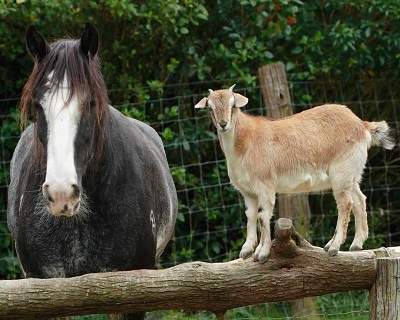
When it comes to horses and goats, things get a little bit trickier. Horses and goats get along just fine, don’t get me wrong, as they are both herd animals. They will bond quickly with one another, and they can keep each other company on the same pasture. However, male goats can be quite aggressive towards other animals. They can be quite aggressive towards humans as well.
For this reason, horses get along with female goats best. For your horse’s sake, it’s always a good idea to pair it up with goats that don’t have any horns. Just to be on the safe side. Introducing a goat to a horse should be done gradually and with patience. Don’t leave these animals alone with one another too soon because the horse might end up injuring the goat by kicking it.
If the goat and the horse are both comfortable with each other, they’ll get along just fine and they’ll spend some quality time together. Horses are not aggressive towards animals they don’t perceive as a threat. A calm, docile female goat is probably the least threatening thing on the pasture, and your horse will definitely know this as well.
When it comes to disease, horses and goats can’t transmit any parasites or diseases between them, which makes it safe for them to be in each other’s company. Another thing they can’t share is commercial feed. Keep in mind that goats can’t eat commercial horse feed, so make sure to keep the goat away when you feed your horse. However, goats can eat the same hay that you feed your horse, and they can both nibble on the same pasture.
I’m sure I must have mentioned on this blog before that horses don’t like to be alone or sleep alone. They’re herd animals, and they feel safer and more content when they’re around other horses or other herd animals. If you’re looking for a cheap companion for your horse, a goat is an excellent idea.
Horses and alpacas/llamas.
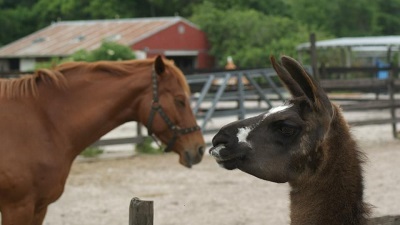
The main difference between alpacas and llamas is size. Alpacas are generally much smaller than llamas, but they share many physical and behavioral characteristics. That’s why I decided to group them together in this segment regarding their relationship with horses.
Alpacas are gradually becoming more and more popular as horse companions. They often mix well with horses, they help keep the weeds down on the pasture, and they don’t share the same parasites.
The main problem I see with horses and alpacas is the initial introduction. Many horses seem to be quite terrified of alpacas when they see one for the first time. After a while, they learn to accept them and can coexist with them without any issues. Keep an eye out for any signs of initial aggression, though. Alpacas are relatively fragile creatures when compared to horses, and they can easily be injured by one.
It’s also worth keeping in mind that alpacas and llamas don’t behave the same. Llamas can sometimes be more sociable because they were bred for the pack. Alpacas were initially bred for fleece quality, so they don’t have as many “social skills.” Moreover, male llamas can be more dominant than alpacas, especially if they’re not gelded.
Before you decide to mix these animals or introduce them to one another, make sure that you do some extensive reading on alpacas and llamas in order to learn about the potential challenges that you may face.
Do horses get along with donkeys?
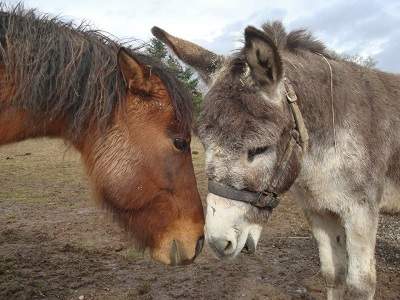
If you’re wondering whether donkeys are good companions for horses, let me reassure you. Horses and donkeys get along very well, and they are known to form lifelong bonds of friendship and companionship. Donkeys are generally calm, wise, and very responsive to affection. They are more stoic than horses, in the sense that they will tend to stand their ground when threatened instead of running away.
They also have a better memory than horses, and they require less training when learning new tricks. When it comes to sharing a pasture or a paddock with a horse, a donkey will have little to no issues. They can share the same pasture, too, and will generally help each other feel safe and comfortable.
The main issue with keeping donkeys and horses together is a medical one. Donkeys are notorious for their lack of signaling whenever they are sick or something is wrong with them. In the case of lungworm, donkeys are much more resilient to it when compared to horses. Horses will exhibit clearer symptoms such as fast breathing and coughing, while donkeys will not.
The good news is that any such issues can be avoided with some preventive testing. Keep in touch with your vet and make sure to test any new donkeys or mules before allowing them to make contact with your horses.
Horses and sheep.
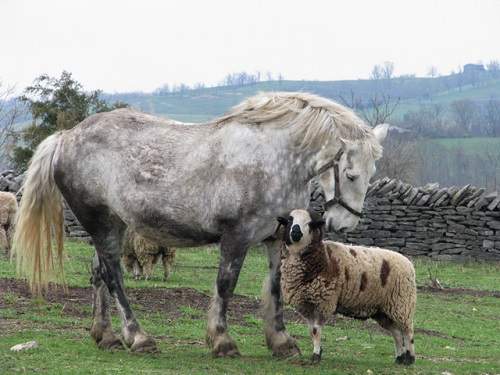
Sheep (not rams) are probably the calmest and most docile livestock, apart from horses, of course. Horses and sheep should get along exceptionally well if they’re properly introduced and have a bit of time to get accustomed to one another. There have been reports of horses attacking sheep or even killing them if the initial introduction is done poorly.
Keep in mind that horses are fight or flight animals, and they might attack the sheep if they perceive it as a threat. However, it’s your responsibility to make sure that doesn’t happen. What I’d recommend is to introduce the two animals from across a fence. Let the horse smell the sheep and vice versa, and only leave the two unattended when they are comfortable with each other’s presence.
It shouldn’t take too long for the horse to realize that the sheep are not threatening. Sheep don’t attack people or other animals, and they’re generally content just grazing their days away in peace. Horses like to be around other animals, especially if they’re as calm as they are. Sheep definitely tick the right boxes here. To make things even better, sheep and horses don’t even share the same parasites, so keeping them close is also safe from a medical perspective.
Horses and pigs.
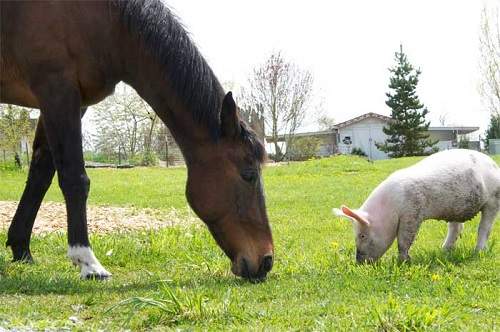
When it comes to horses and pigs, things are a bit more complicated. That’s because pigs and horses have little in common, both in terms of behavior, favorite outdoor activities, and diet. That’s not to say that these two animals will be aggressive towards each other. It’s just that pairing them up doesn’t make much sense for either of them.
Even if you turn them out on the same pasture, these two are not likely to form an emotional bond. Moreover, the pig’s behavior is likely to cause some problems for your horse. Pigs are known for rutting around in the ground and digging holes. This will prevent the soil from growing forage that your horse needs to graze on each day. Moreover, the horse can eventually end up tripping in those holes.
I should also mention that pigs can be aggressive when it comes to food. If the horse mistakenly gets between a pig and its food, the pig might decide to attack the horse, charge at it, or even bite it. Even though the pig will be smaller, it could still cause some serious damage to the horse’s legs.
All that being said, pairing up horses with pigs is probably a bad idea. There are many other animals to choose from if you’re looking for a calm and well-behaved companion for your horse.
Horses and rabbits.
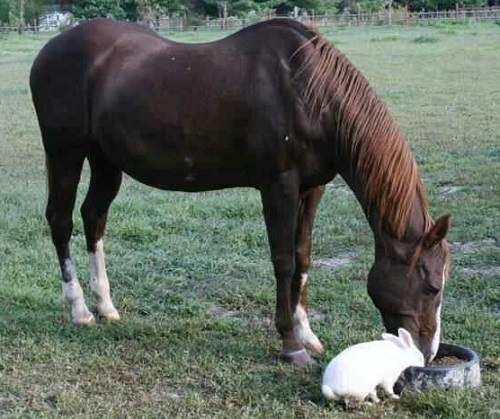
Horses and rabbits do get along, both in the wild and in domestic scenarios. Generally-speaking, rabbits, and horses pretty much share the same diet, and will gladly share a pasture without bothering each other. Rabbits are easily startled by nature, so they won’t go around trying to make friends with such a large animal as a horse.
They won’t mind being in their proximity from time to time, though, and they’ll gladly jump around and into haystacks that the horse might be feeding on. These two animals ignore each other most of the time. Horses don’t mind bunnies, as bunnies stay out of their way and vice versa.
Rabbits are more likely to run away from humans in the wild. They are more used to horses and other large animals.
Can horses and chicken live together?
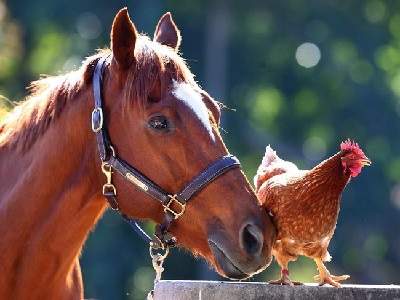
Horses and chicken are great when paired together, not necessarily because they will form bonds, but because their lifestyles complement each other. Many horse owners have begun seeing great benefits after introducing chicken to horses. Let me explain: chicken will eat fly larvae and will clean up any piles of horse manure. Their presence will greatly reduce the number of flies, and they will also disperse worm eggs and worm larvae as they peck the ground on the pasture.
While keeping chicken and horses together on the same pasture is generally a good idea, what’s not a good idea is cooping them up together in the same barn. That’s because chicken droppings can pose various health issues for horses, including Salmonella infections, botulism, and some fungal infections.
What I’d recommend is keeping horses and chicken together on the same pasture if possible, but housing the chicken in a separate coop at the end of the day. This will ensure that the horse’s barn remains relatively clean and free from any potential infections. It might be tempting to house horses and chicken together in order to keep the chicken safe. While this might be safer for the chicken, it will be harmful to the horse.
When it comes to attachment, sometimes a chicken will form a bond with a horse. Some chicken is incredibly calm and well-behaved even with humans. If you give them enough attention and treat them with care, most of them will be content to sit on your lap and receive some petting. A horse might not be able to give a chicken the same amount of attention, but even so, chickens are known to form the occasional bond with a horse.
Do horses get along with cows?
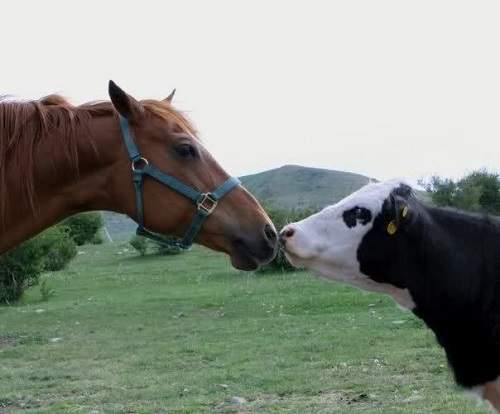
Both horses and cows are herd animals and prey animals. This means that they will always seek social interaction and protection within a herd. If you were to put one horse in a herd of cows, that horse will try to integrate within the herd even if that’s not a herd of horses. The cow will express a similar behavior, so these two types of animals are similar in many ways.
Problems arise if you try to mix a herd of horses with a herd of cattle. In that case, the horses will stick to their own, and the cows will do the same. Since horses are a bit more dominant, they might chase the cows away when it’s feeding time, so it’s always a good idea to separate the herds for feeding.
There are some advantages to keeping both horses and cows on the same pasture, though. Horses and cows eat different types of grass, so keeping them both on the pasture will help you utilize it to its full potential. Moreover, these two animals don’t share the same parasites. If a horse ingests the larvae of a cow parasite, it will actually kill it, and vice versa. This way, both animals keep each other safe.
Feral horses and other animals.
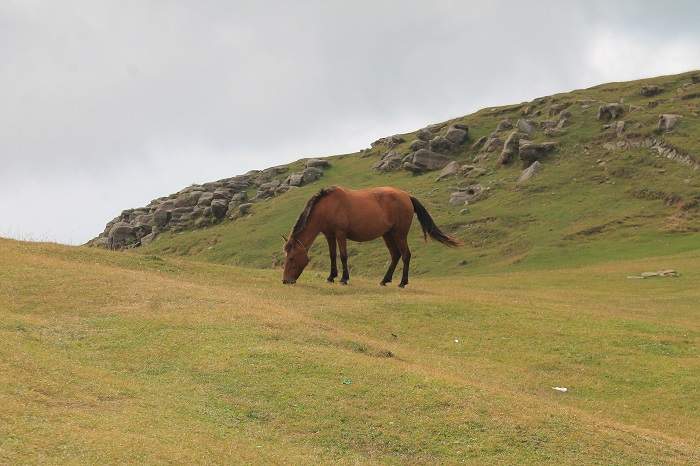
Feral horses are not as calm and well-mannered as domesticated horses, but that’s because they need to be as sharp as possible in order to survive in the wild. As I mentioned before, horses are prey animals, and they have plenty of dangerous animals to watch out for.
Some of the most common animals that prey on horses include mountain lions, wolves, bears, coyotes, and even humans. Therefore, feral horses have evolved to be suspicious of any animal that comes too close to the herd. Feral horses will either run away from an animal that it perceives as a threat, or it will attempt to attack it. You’ll rarely find a feral horse alone in the wild, as these animals always try to form a herd in order to keep each other safe.
Feral horses can be tamed and taught to behave properly even if they were born in the wild. Basic training usually takes just a few months to complete. However, if you just brought a feral horse home, it’s important to keep it away from other animals for everyone’s sake.
Conclusion.
Horses will get along with other domestic animals, even if they have to share the same pasture. These gentle giants will rarely attack a dog, a cat, a donkey, a sheep, or a cow, and they’ll do their best to either socialize with them and form a bond, or just leave them alone altogether.
Introducing a horse to a new animal can be a challenge, which is why it’s always a good idea to do it gradually and with patience. Horses don’t form bonds with all animals, but they get along splendidly with the ones they do. If you’d like to share a story about your horse interacting with another animal, feel free to do so below.

